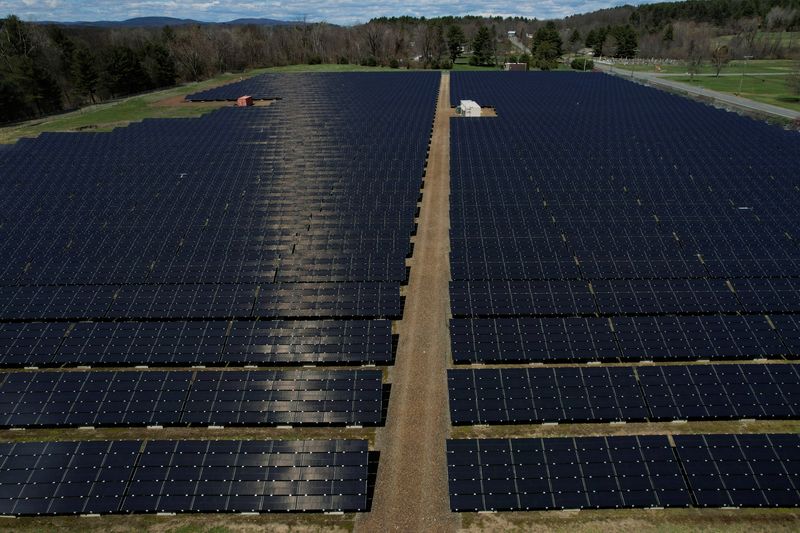Concerns Over Chinese-Made Communication Devices in Renewable Energy
LONDON (Reuters) – U.S. energy officials are currently evaluating the risks associated with Chinese-made devices integral to renewable energy systems. This follows the discovery of unexplained communication equipment embedded within these devices, as indicated by two knowledgeable sources.
Power inverters, primarily manufactured in China, are employed globally to connect solar panels and wind turbines to electricity grids. Additionally, these inverters are utilized in batteries, heat pumps, and electric vehicle chargers.
Potential Security Risks of Power Inverters
Though inverters are designed for remote access for updates and maintenance, utility companies typically bolster security by implementing firewalls to prevent direct communication back to China. Nonetheless, U.S. experts have uncovered unauthorized communication devices not documented in the product specifications of some Chinese solar power inverters. These were discovered during security assessments that involved disassembling equipment connected to electrical grids.
In the past nine months, undocumented communication devices, including cellular radios, have also been identified in batteries from several Chinese manufacturers. However, it remains unclear how many solar power inverters and batteries have been inspected by authorities.
Implications of Rogue Communication Devices
The presence of these unauthorized components introduces additional, undocumented communication channels that could potentially bypass firewalls, posing severe security threats. Industry experts warn that the potential ramifications could be catastrophic, allowing unauthorized third parties to disrupt grid operations.
The individuals discussing these security concerns have chosen to remain anonymous due to restrictions on speaking to the media.
“We know that China believes there is value in placing elements of our core infrastructure at risk,” stated a former director of the U.S. National Security Agency. “The Chinese aim to limit the West’s responses to these security issues by ensuring widespread use of their technologies.”
Reactions and Countermeasures
The Chinese embassy in Washington responded by opposing the generalization of national security concerns and criticized the characterization of China’s contributions to infrastructure development.
Experts argue that potential misuse of these communication devices—whether to disable inverters remotely or modify their settings—could destabilize power grids, inflict damage on energy infrastructure, and cause large-scale blackouts. One expert articulated that this essentially creates a built-in capability to physically sabotage the grid.
The manufacturers of the affected inverters and batteries, as well as the total count of rogue devices found, have not been disclosed.
Previously unreported, the discovery of these rogue devices has not garnered public acknowledgment from the U.S. government. In response to inquiries, the U.S. Department of Energy (DOE) reiterated its commitment to continually assess risks linked to emerging technologies and noted the challenges in ensuring manufacturers disclose full functionality. A spokesperson emphasized the importance of understanding product capabilities among purchasers.
Strategic Reassessment Amid Rising Tensions
As tensions between the U.S. and China escalate, a reevaluation of China’s involvement in essential infrastructure is underway due to the growing concerns about security vulnerabilities. A Republican committee member on Homeland Security highlighted the real and escalating threat posed by the Chinese Communist Party, whether through telecom hacks or remote access to solar and battery inverters. He emphasized the necessity to intensify efforts to protect national interests.
In February, two U.S. Senators proposed the Decoupling from Foreign Adversarial Battery Dependence Act, which would prohibit the Department of Homeland Security from procuring batteries from certain Chinese firms beginning October 2027 due to national security risks. This legislation targets several companies closely associated with the Chinese government.
Utility companies are preparing for similar bans affecting Chinese inverter manufacturers. Some utilities, including Florida Power & Light Company, are already attempting to minimize their reliance on Chinese inverters by diversifying their supply sources.
Dominance of Chinese Companies in Inverter Market
Huawei stands as the largest inverter supplier globally, accounting for 29% of shipments in 2022, with other Chinese companies like Sungrow and Ginlong Solis also holding significant market shares. However, some solar developers, such as 1Komma5, actively avoid Huawei products due to their security risks.
The CEO of 1Komma5 mentioned that the growing reliance on Chinese inverters could pose a more substantial risk to energy grids as renewable capacity expands. The U.S. has limited Huawei’s access to domestic technology since 2019, alleging national security threats, which Huawei denies. Meanwhile, various Chinese companies are legally obligated to cooperate with the Chinese government, granting authorities potential control over domestically manufactured inverters linked to foreign grids.
Global Energy Security Measures
In Europe, the exercise of control over just a fraction of energy supply by rogue actors could result in significant disruptions. The European Solar Manufacturing Council has estimated that over 200 GW of solar capacity in Europe is connected to Chinese-made inverters, equating to the output of more than 200 nuclear power plants.
Security professionals warn that the simultaneous remote control of numerous inverters could have disastrous consequences for grid stability. Other nations, including Lithuania and Estonia, have recognized these threats and initiated measures to limit Chinese technology in critical sectors. Lithuania has already enacted laws blocking remote access to energy installations above a certain threshold, effectively limiting the use of Chinese technology.
Conclusion: Addressing Strategic Dependencies
The review of Chinese renewable energy technology in the British energy system is set to conclude soon, amidst discussions on inverters and their implications for national security. Recent events in which some solar power inverters in the U.S. were disabled from Chinese sources underscore the risks of foreign influence, prompting concerns among government officials.
As the energy sector lags behind telecommunications and semiconductor industries in addressing security vulnerabilities, analysts assert that significant challenges lie in implementing more stringent security requirements. Notably, household solar power systems often escape regulatory scrutiny despite their increasing contribution to energy generation. NATO officials have underscored the escalating risks presented by Chinese attempts to control critical infrastructure in member states, advocating for the identification and mitigation of strategic dependencies.
https://www.yahoo.com/news/ghost-machine-rogue-communication-devices-050547906.html



